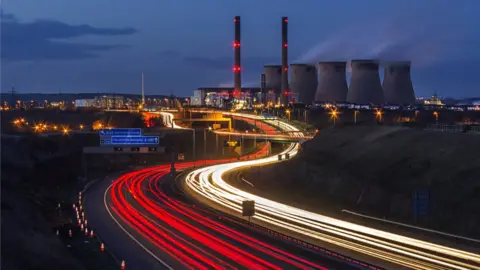Cars buck falling CO2 emissions trend
 Getty Images
Getty ImagesBritain's carbon emissions have sunk to the level last seen in 1890 – the year before penalties were first awarded in football.
In 2017, CO₂ emissions from fossil fuels fell by 2.6%. This was mainly driven by a 19% decline in coal use.
It follows a 5.8% fall in 2016, which saw a record 52% drop in coal use, according to the green website Carbon Brief.
The figure is doubly striking as emissions from cars have been going up.
The analysis is based on government energy-use figures. The government will publish its own CO₂ estimates later in March.
Last year, Carbon Brief's preliminary assessment of CO₂ proved accurate.
This year’s shows that the UK's total CO₂ emissions are currently 38% below 1990 levels.
They have been decreasing steadily since 2012, with big falls in 2014 and 2016. The decline continued in 2017.
Oil and petroleum use increased slightly, though not enough to offset the falls in CO₂ associated with other fuels.
Vehicles in reverse
Leo Hickman, editor of Carbon Brief, told BBC News: "The data highlights the dramatic impact that the rapid decline of coal-fired power plants is having on the UK's emissions.
"The drop was not as pronounced as in 2016, but in 2017 coal was joined by a fall in the use of gas due to a milder winter."
But he warned: "If the UK is to meet its climate targets over the next few decades, this rate of decline will need to be maintained, even accelerated.
"Action will need to be focused on the transport and building sectors, where emission reductions remain elusive."
Vehicles are a creating a real CO₂ headache for the government, with average emissions for new cars rising for first time since 2000.
The motor industry blamed the public backlash against diesel vehicles driven by concerns about local air pollution. But environmentalists said it was also caused by a manufacturing trend towards SUVs.
Tax incentives
Alex Buttle, from the website Motorway.co.uk, said: "Clearly, the government hasn't thought through the environmental impact of their anti-diesel campaign.”
He called for new tax breaks for electric and hydrogen cars.
But Paul Morozzo, from Greenpeace, told BBC News: "SUV sales have had more of an impact on average CO₂ emissions than the shift away from diesel.
"The industry just isn't doing enough to tackle either carbon or air pollution from its vehicles."
Another key factor is a change in tax policy. Previously, low-emissions vehicles used to be rewarded by zero car tax, but in 2015 the then Chancellor George Osborne lumped everything but electric and hydrogen cars into the same tax band.
That left the owner of a Porsche paying the same as the owner of a Toyota Prius.
The head of the AA, Edmund King, forecast at the time: "This is really counter-productive. Drivers will not be given the same incentive to go for cleaner cars, so there won't be the same pressure on manufacturers to produce those cleaner models."
It appears he was right.
Follow Roger on Twitter @rharrabin
